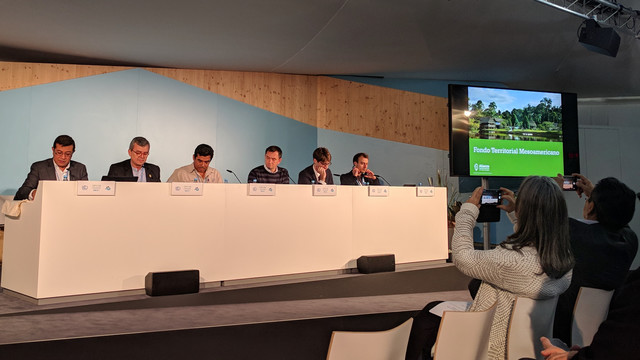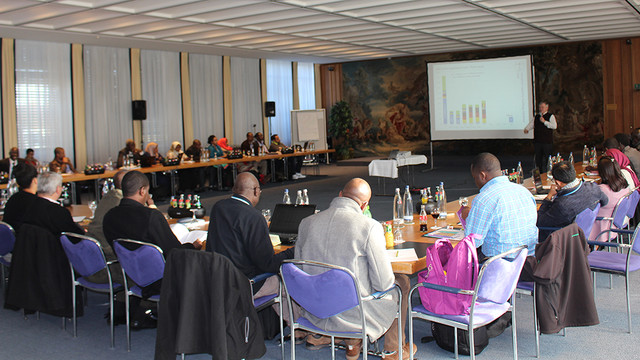Transparency and accountability in the Paris Agreement: eight questions climate negotiators must tackle
Transparency and downward accountability, arguably key aspects to delivering the Paris Agreement, will be one of four evidenced themes explored at this year's Development & Climate Days (D&C Days). Simon Anderson sets out some tough questions that will be addressed around this theme during the two-day event and explains how session outcomes will seek influence in COP23 climate negotiations and beyond.


Participants discuss climate resilience issues during a session at D&C Days 2016 (Photo: Matt Wright/IIED)
The disparity between the scale of estimated losses from climate impacts and international adaptation funding available to ameliorate expected damage is widening. Governments will need to significantly step up funding from their own resources and efforts to access global finance to help manage the shortfall.
But will adaptation funding, pledged in Nationally Determined Contribution (NDC) commitments and from international sources, be tracked accurately and effectively?
Both transparency and accountability mechanisms for the effective measurement, reporting and verification (MRV) of climate mitigation measures, and the monitoring and evaluation (M&E) of adaptation finance investment effectiveness are insufficient.
Unpicking complex requirements
Transparency and accountability are arguably the two most important yet complex elements to be negotiated under the Paris Agreement. And while addressed separately, they are inherently interlinked.
To tackle this critical and contentious area, transparency and downward accountability requirements of the climate deal will be one of four themes at this year’' D&C Days.
This strand of sessions will explore how climate action is prioritised, how climate finance is directed, and how this contributes to achieving climate resilience for all – the overall focus of the D&C Days programme (PDF) this year.
Sessions will examine new, innovative ways of enhancing downward accountability and tracking the equity of benefit distribution from adaptation, as well as how the Least Developed Countries (LDCs) are approaching the transparency and accountability framework in the Paris Agreement.
Key messages from the transparency and downward accountability sessions will be promoted at targeted events during the second week of COP23 to different negotiating groups including the LDCs and the European Union. A post-COP influencing strategy is set out at the end of this blog.
Eight key questions
The event's host partners have identified some of the toughest questions around the more contentious areas of transparency and accountability that have emerged following the signing of the Paris climate deal:
- How can we achieve a common global transparency mechanism with built-in flexibility that will enable less capable developing countries to effectively ratchet up and demonstrate climate action in the coming years?
- What are the modalities, procedures and guidelines for reporting and review, to support implementation of the agreement?
- What features of NDCs will help facilitate clarity, transparency and understanding at international level and build trust among parties?
- What capacity building, financial and other support will be needed and made available for transparency-related activities for developing countries?
- Can transparency and accountability discussions be linked to the current UNFCCC MRV framework, and if so, how?
- What lessons have been learned so far from countries that are communicating their plans and reporting through national communications, national greenhouse gas inventories, biennial update reports, technology needs assessments and National Adaptation Plans (NAPs)?
- What will be the linkages between the transparency framework, global stocktake and compliance? (For example, can a review report on the implementation of an NDC be a trigger for a case of compliance?)
- Can the UNFCCC's Compliance Committee really promote and ensure transparency?
The accountability discussion is mainly linked to markets, financial support and mitigation activities. Developing countries have large disbursements to support adaptation through bilateral support or from international climate funds. But as implementation of the Paris Agreement has got under way, technical and institutional blockages are emerging. These are preventing adaptation finance from having an impact on the ground.

Attention has turned to developing mechanisms, tools and approaches that can hold governments to account for ensuring that this finance delivers the intended benefits to vulnerable populations.
The experience gained through these initiatives can support a more robust global stocktake for adaptation, as laid out in Article 14 of the Paris Agreement and discussions on an enhanced transparency framework under Article 13.
Achieving influence
This year, we're aiming for D&C Days to move beyond being a great forum for interaction and making connections. We want it to become a process over a series of events and engagement where experience, evidence and learning of host partners and participants is aggregated into key messages. These can then be taken into the climate negotiations, into business sector planning, and into the formulation of climate adaptation strategies.
Each of the event's four themes will be explored in a variety of ways, with the goal of revealing sound learning, new and unexpected perspectives, and results that will challenge existing thinking.
Theme leaders will take responsibility for developing, maintaining and updating a chronicle of the dialogue and evidence on their theme. At future D&C Days the themes will form the platform for a further round of dialogue.
At targeted events during the second week of COP23 we will promote key messages from the transparency and downward accountability theme as we seek to influence the negotiating positions of country delegations, including the LDCs and EU. We will develop web-based outputs that people can refer and respond to, while host partners, through collaboration, will submit these key messages on issues related to transparency and downward accountability to the UNFCCC.
About D&C Days
Over the last decade, D&C Days has built a reputation for providing stimulating and interactive debate of topics and issues at the interface of development and climate change. This year the host partners intend to go further.
VIDEO: What is Development & Climate Days at COP all about? Join us to talk resilience in 2017 at #COP23: https://t.co/ZOETiwwFkC #DCdays17 pic.twitter.com/okkorSzhdM
— IIED (@IIED) October 15, 2017
We have elaborated a strategic plan to contribute to the achievement of the Paris climate ambition, and seek to do this by bringing evidence into dialogues aimed at influencing key stakeholders – the private sector, the climate negotiators and the climate adaptation community.
The host partners – Red Cross Red Crescent Climate Centre, IIED, the International Development Research Centre (IDRC), the Global Facility for Disaster Reduction and Recovery (GFDRR), the Mary Robinson Foundation – Climate Justice (MRFCJ), We Mean Business (WMB) and the German Development Institute/Deutsches Institut für Entwicklungspolitik (DIE) – have selected crucial themes where evidence is needed.
Please join the community of practitioners, negotiators, scientists and policymakers at D&C Days during COP23 in Bonn as we seek big answers to the toughest questions and work together to find fair solutions.
Simon Anderson (simon.anderson@iied.org) is a senior fellow in IIED's Climate Change research group.



